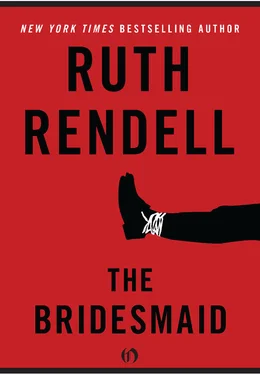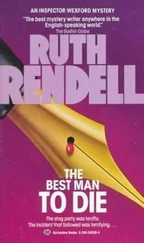Ruth Rendell - The Bridesmaid
Здесь есть возможность читать онлайн «Ruth Rendell - The Bridesmaid» весь текст электронной книги совершенно бесплатно (целиком полную версию без сокращений). В некоторых случаях можно слушать аудио, скачать через торрент в формате fb2 и присутствует краткое содержание. Год выпуска: 2010, Издательство: Open Road Integrated Media LLC, Жанр: Триллер, на английском языке. Описание произведения, (предисловие) а так же отзывы посетителей доступны на портале библиотеки ЛибКат.
- Название:The Bridesmaid
- Автор:
- Издательство:Open Road Integrated Media LLC
- Жанр:
- Год:2010
- ISBN:нет данных
- Рейтинг книги:3 / 5. Голосов: 1
-
Избранное:Добавить в избранное
- Отзывы:
-
Ваша оценка:
- 60
- 1
- 2
- 3
- 4
- 5
The Bridesmaid: краткое содержание, описание и аннотация
Предлагаем к чтению аннотацию, описание, краткое содержание или предисловие (зависит от того, что написал сам автор книги «The Bridesmaid»). Если вы не нашли необходимую информацию о книге — напишите в комментариях, мы постараемся отыскать её.
The Bridesmaid — читать онлайн бесплатно полную книгу (весь текст) целиком
Ниже представлен текст книги, разбитый по страницам. Система сохранения места последней прочитанной страницы, позволяет с удобством читать онлайн бесплатно книгу «The Bridesmaid», без необходимости каждый раз заново искать на чём Вы остановились. Поставьте закладку, и сможете в любой момент перейти на страницу, на которой закончили чтение.
Интервал:
Закладка:
“I don’t know really. I reckon it was on account of Senta. Her mother’s ten years older than Mum but she’s always having affairs. She’s got this new lover, Darren was telling me, and he’s not thirty, and I told Mum, and that’s when she came out with it. ‘I had an affair with Gerard,’ she said. ‘Well, just the once.’ You know how she gets expressions just that little bit wrong. ‘We had an affair that evening he came round with the wine and said he liked Flora.’”
He said nothing. Fee lifted her shoulders. He felt the movement against his own, but he didn’t look at her. Without saying a word to each other, the idea came to them simultaneously to turn back. Fee called to Hardy and put him on the lead. After a little while she began talking about her wedding, the arrangements at the church, the times the various cars would come to the house. Philip felt confused and angry and inexplicably terribly upset. When they returned to the house, he knew he would be incapable of facing Christine again that night, and he went straight upstairs to his room.
CHAPTER THREE
As a place to sleep in, it was rather small, but it would make a spacious bathroom. It wasn’t for him to ask why Mrs. Ripple should wish to sacrifice her third bedroom in order to have a second bathroom, though he tended to wonder about these things. In other people’s homes, as he so often was these days, Philip found himself speculating about all sorts of oddities and incongruities. Why, for instance, did she keep a pair of binoculars on the windowsill in here? To watch birds? To observe the behaviour of neighbours?
The dressing table was very low and there was no stool. If a woman wanted to do her hair or put makeup on in front of the mirror, she would have to sit on the floor. In the small bookcase were nothing but cookery books. Why didn’t she keep her cookery books in the kitchen? He took his tape measure from his pocket and began measuring the room. Four metres thirty by three metres fifteen, and the ceiling height two metres fifty-two. He wouldn’t be doing the design himself, he hadn’t progressed so far yet. In any case, there would be nothing inspired or ambitious about it. Champagne bath and basin, she had chosen, a vanity unit with black marble top, and milk-coloured tiles with a black and gold floral pattern.
The window was to be double glazed. He took his measurements with concentrated care. Roy would want to know widths and lengths to the nearest millimetre. The figures written down in his neat small hand in the Roseberry Lawn Interiors notebook, Philip leaned on the windowsill and looked outside.
A collage of gardens lay below him, all the same size, each one separated from its neighbours by fencing with trellis on it. It was the most beautiful time of the year, and the ornamental trees were in fresh new leaf, many of them in blossom, pink or white. Tulips were in bloom. These were one of the few flowers Philip knew by name. The velvety brown and gold things which filled the end of Mrs. Ripple’s garden he thought might be wallflowers. Beyond the gardens which backed on to those on this side was a row of houses, their rear aspects facing him. No doubt they had started off all the same but various additions, a loft made into a bedroom, a conservatory built on, an extra added garage, now differentiated them and made each an individual. Only one seemed still as the builder had built it, but it had the best garden, with a pink may tree halfway down, where the lawn was broken into by a rock garden. Over this spilled and sprawled a carpet of purple and yellow alpine plants.
Surveying this tumbled spread of flowers, sheltered to some extent by the branches of the pink tree with its rose-coloured blossoms, stood a small statue in marble. Philip couldn’t see it very clearly, it was too far away, but something in its attitude seemed familiar, the angle of its slightly upraised face, the outstretched right hand holding a bunch of flowers, the feet that, though planted firmly on the ground, yet seemed to be dancing.
He wished very much that he could get a closer look at it. Then he realised that he could. The binoculars were here on the windowsill. He took them out of their case and raised them to his eyes. A certain amount of adjustment was needed before he could see clearly—and then, suddenly, the vision they afforded him was amazing. They were excellent glasses. He could see the little statue as if it were no more than a metre away from him. He could see her eyes and her lovely mouth and the waves in her hair, the diagonal weave in the fillet which bound it, the almond curves of her fingernails, and the details of the flowers, their stamens and petals, in the sheaf she carried.
And he could see too the green stain that travelled from the side of her neck to where her robe covered her breasts, and the tiny chip out of her left earlobe. He had made that chip himself when he was ten and a stone fired from his catapult had clipped the side of her head. His father had taken away the catapult, and docked his pocket money for three weeks. It was Flora. Not a look-alike or a copy, but Flora herself. As Fee had pointed out, she wasn’t one of those mass-produced plaster ornaments to be seen in their dozens of every motorway junction garden centre. She was unique. He remembered, rather incongruously, what Cheryl had said of her while talking to Arnham about their father. She was the Farnese Flora, who was traditionally associated with may blossom.
Philip replaced the binoculars in their case, put away his measure and his notebook, and went downstairs. Some clients you had to search for, cough, knock on doors to summon them. Mrs. Ripple wasn’t of that sort but alert, spry, hawk-eyed. She was a middle-aged woman of great spirit and vigour, very sharp tongued and, he suspected, critical. She had a shiny, sore-looking face and a lot of dark hair with threads of grey in it like fuse wire.
“I’ll be in touch when the layout is completed,” he said to her, “and then you’ll see me again when work commences.”
It was the way they were taught to speak to customers at Roseberry Lawn. Philip had never actually heard a human being snort, but that was the kind of sound Mrs. Ripple made. “When’s that going to be?” she said. “Sometime next year?”
There had been a delay about sending her their brochures, Roy said, adding that he didn’t think she was likely to forget it. Philip assured her, with as radiant a smile as he could manage, that he hoped it would be no more than four weeks at the outside. She said nothing in reply, left him to open the front door and close it after him. Philip got into his car, a three-month-old blue Opel Kadett, thinking as he sometimes did that it was the only nice thing he possessed, though he didn’t really possess it—it belonged to Roseberry Lawn.
Instead of driving back the way he had come, he took the first left-hand turning and then turned left again. This brought him out into the street where the row of houses must be whose rears faced the back of Mrs. Ripple’s. They looked very different from this aspect. He hadn’t counted precisely where in the row the house with the statue in its garden came, but he knew it must be fourth or fifth from the block of flats with green pantiled roof. It was also the only one without additions. And here it was, this must be it, between the house with the window in its roof and the house with the two garages. Philip drove past slowly. It was gone five, his day was over, so he wasn’t wasting the firm’s time, something he was still conscientious about.
At the end of the road, at a T-junction, he turned round and drove back. Opposite the house he parked the car by the kerb and switched off the engine. The front garden was small, with a rosebed in which the roses were not yet out. Three steps led up to one of those Georgian front doors with a sunburst fanlight. A feature of the house—Philip was sure it would be called a feature—was a small circular stained-glass window a little way above the front door.
Читать дальшеИнтервал:
Закладка:
Похожие книги на «The Bridesmaid»
Представляем Вашему вниманию похожие книги на «The Bridesmaid» списком для выбора. Мы отобрали схожую по названию и смыслу литературу в надежде предоставить читателям больше вариантов отыскать новые, интересные, ещё непрочитанные произведения.
Обсуждение, отзывы о книге «The Bridesmaid» и просто собственные мнения читателей. Оставьте ваши комментарии, напишите, что Вы думаете о произведении, его смысле или главных героях. Укажите что конкретно понравилось, а что нет, и почему Вы так считаете.











